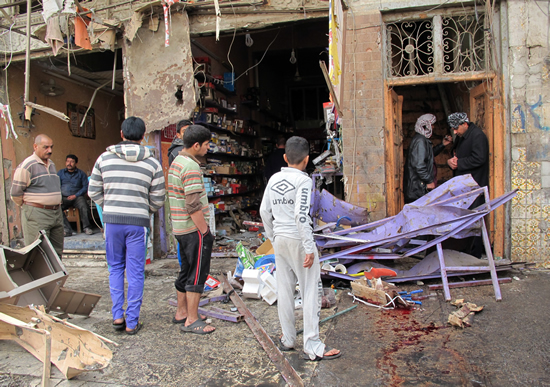
Iraqis inspect the damage after a wave of attacks in Baghdad killed at least 57 people on December 22, 2011. The apparently coordinated blasts were the first major sign of violence in a row that has threatened Iraq's fragile political truce and heightened sectarian tensions just days after US forces completed their withdrawal. AFP PHOTO/KHALIL AL-MURSHIDI
The Obama Administration’s risky decision to seek the quickest possible exit from Iraq has contributed to a mushrooming political crisis there that is rapidly unraveling the hard-won gains of U.S. troops and threatens to plunge the country into a civil war that will greatly benefit Iran.
Shortly after the December 15 end-of-mission ceremony for U.S. troops, Iraqi Prime Minister Nouri al-Maliki purged many senior Sunni Arab political leaders from his fractious governing coalition. Maliki’s government, dominated by Shiite political parties of various stripes, also announced that it will prosecute Vice President Tareq al-Hashemi, a leader of the predominantly Sunni Arab Iraqiyah party, on terrorism charges. Hashemi, who denounced the allegations as propaganda cover for a political coup, has fled to the semi-autonomous Kurdish region in northern Iraq.
Iraq’s fragile unity is now dissolving in growing political tensions between the leaders of the Shiite majority and Sunni minority and between the Shiite-dominated central government and the non-Arab Kurdish minority. But the Obama Administration, blindsided by simmering tensions that it had downplayed in its rush for the exit, appears to be on auto-pilot.
The Administration gave a higher priority to domestic political considerations than to Iraq’s long-term security needs when it neglected to negotiate an extension of the U.S. troop presence past the end-of-year deadline set by the 2008 Status of Forces Agreement. Although the Bush Administration had envisioned a follow-on agreement to extend the military presence, and the Obama Administration had initially planned for a smaller residual force of military trainers and advisers, in the end politics trumped security in the White House’s deliberations.
President Obama, who won office campaigning as an opponent of the Iraq war, treated Iraq as an inconvenient commitment that should be ended as soon as possible, not a war to be won. He made it clear that his Administration was eager to “turn the page” and leave Iraq as soon as possible.
The Heritage Foundation warned repeatedly about the damaging consequences of an abrupt U.S. pullout from Iraq. We have stressed the need for strong American leadership to consolidate a stable peace in Iraq.
But the Administration chose to disregard these and other warnings and pressed ahead to terminate the U.S. military presence. This removed a safety net below the Iraqi coalition government that now is disintegrating as rival leaders fall back on their own ethnic or sectarian camps to provide for their security. Iran, which has backed radical Shiite parties and fanned suspicions of the Sunni political leaders, is likely to emerge as the big winner.
































8 Replies to “Iraq Plunges into Chaos as Obama Administration Celebrates End of U.S. Military Presence”